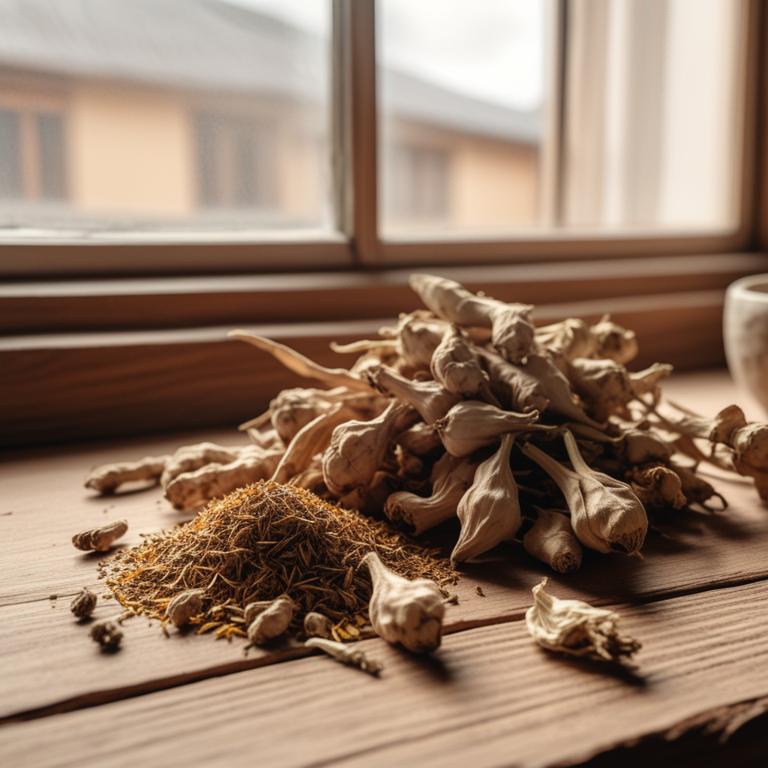Updated: Dec 1, 2024
Eye Pain Treatment: Exploring Medicinal Herbs and Herbal Preparations

Eye pain can be a real nuisance, making everyday tasks a chore.
It can be a sharp, stabbing sensation or a dull, throbbing ache that won't go away. When you're experiencing eye pain, even simple things like reading or watching TV become difficult. Eye pain can be caused by a variety of factors, such as dryness, fatigue, or even an underlying medical condition. Sometimes, it can be triggered by something as simple as computer use or reading in low light.
Fortunately, there are some herbal remedies that can help soothe eye pain. Herbs like calendula and chamomile have anti-inflammatory properties that can help reduce swelling and ease discomfort. The roots of the licorice plant also have anti-inflammatory properties and can help calm irritated eyes. You can use these herbs to make teas or infusions that you can drink to help ease eye pain. You can also use cooled tea bags as a compress to apply directly to the affected eye.
Some herbalists also recommend using eye drops made from herbal extracts to help reduce inflammation and promote healing.
Table of Contents
- What causes the sensation of eye pain?
- What advantages can be gained from using herbs to address eye pain?
- What are the primary medicinal herbs for addressing eye pain?
- What herbal preparations are commonly used to alleviate discomfort in the eyes?
- Which herbs are not suitable for individuals who have eye pain?
- FAQ
What causes the sensation of eye pain?
The main causes of eye pain are often related to issues with the eyes' surface or internal structures.
One common cause is Dry Eyes, which occurs when the eyes don't produce enough tears or the tears are of poor quality. This can lead to irritation, itchiness, and pain in the eyes. Another cause is Conjunctivitis, also known as pink eye, which is an inflammation of the conjunctiva, the thin membrane covering the white part of the eye.
This is usually caused by a viral or bacterial infection, and can lead to redness, itching, and pain in the eyes. Iritis, also known as anterior uveitis, is a painful inflammation of the iris, the colored part of the eye. It's often caused by an infection, injury, or autoimmune disease, and can lead to severe eye pain, sensitivity to light, and vision problems. Lastly, Glaucoma is a group of eye conditions that damage the optic nerve, often due to increased pressure in the eye.
This can cause eye pain, as well as blurred vision, sensitivity to light, and even vision loss if left untreated.
What advantages can be gained from using herbs to address eye pain?
Using herbs for eye pain can be a great alternative to harsh medications.
These natural remedies can provide quick relief from discomfort and inflammation. One of the main benefits is that they're often free from side effects, making them a safer choice for people with sensitive eyes or allergies. Herbs can also be used topically, allowing you to directly apply the soothing properties to the affected area.
This can be especially helpful for reducing redness and swelling. Additionally, many herbs have anti-inflammatory properties, which can help to calm irritated eyes and promote healing. Some herbs can even help to relax the eye muscles, reducing tension and pressure.
By using herbs, you can find natural relief from eye pain and promote healthy eye function.
What are the primary medicinal herbs for addressing eye pain?

Herbs have been used for centuries to ease eye pain, and many of them have been scientifically proven to be effective.
Echinacea purpurea, also known as coneflower, is known for its anti-inflammatory properties, which can help reduce swelling and pain in the eyes. Calendula officinalis, or pot marigold, has been shown to have antibacterial and anti-inflammatory properties that can help soothe irritated eyes. Euphrasia officinalis, or eyebright, is a natural antiseptic that can help combat eye infections and reduce redness.
Achillea millefolium, or yarrow, has anti-inflammatory and antiseptic properties that can help ease eye pain and reduce swelling. Ginger, or Zingiber officinale, has anti-inflammatory properties that can help reduce swelling and ease pain in the eyes. When used in combination, these herbs can provide relief from eye pain and promote healthy vision. Echinacea purpurea and Calendula officinalis can be applied topically as an eye cream or ointment, while Euphrasia officinalis and Achillea millefolium can be taken as a tea or supplement.
Ginger can be consumed as a tea or added to food to reap its benefits.
What herbal preparations are commonly used to alleviate discomfort in the eyes?

Herbal preparations can be a great way to relieve eye pain.
A decoction is a strong liquid made by boiling herbs in water, and it can be used as an eye wash to reduce swelling and ease pain. To make a decoction, you need to boil the herbs in water for a while, then let it cool down before using it as an eye wash. Tea bags are another popular way to use herbs for eye pain. You can soak a tea bag in hot water, let it cool down, and then put it on your closed eyes to reduce swelling and ease pain. The herbs in the tea bag release their properties into the tea, which helps to calm down the eyes. A tincture is a liquid extract of herbs that can be taken orally to help relieve eye pain. Tinctures are made by soaking herbs in a solvent like alcohol, then straining the liquid to get the extract. You can add the tincture to water or take it directly, and it can help to reduce pain and inflammation in the eyes.
A salve is a topical cream or ointment made from herbs that can be applied directly to the eyes to relieve pain and inflammation. Salves are made by mixing herbs with a carrier oil, then heating it to create a smooth paste. You can apply the salve directly to your eyes to reduce pain and swelling. Capsules are another way to use herbs for eye pain. They contain a dried and powdered form of the herb, which can be taken orally to help relieve pain and inflammation. Capsules are made by filling a gelatin capsule with the powdered herb, then sealing it. You can take the capsule orally to help reduce pain and swelling in the eyes. You can use these herbal preparations separately or in combination to relieve eye pain.
For example, you can use a decoction as an eye wash, then apply a salve to the eyes to reduce swelling and ease pain.
Additional Resources:
Which herbs are not suitable for individuals who have eye pain?
If you're experiencing eye pain, it's best to steer clear of certain herbs that might make it worse.
Ginkgo biloba, for instance, can cause the blood vessels in your eyes to dilate even more, which can increase the pressure and make the pain worse. Glycyrrhiza glabra, commonly known as licorice root, can cause your body to retain water and sodium, leading to swelling in the face and around the eyes, which can be quite painful.
Panax ginseng, or Asian ginseng, can also cause blood vessel dilation, similar to ginkgo biloba, which can worsen eye pain. Valeriana officinalis, or valerian root, can be a bit tricky, as it can cause drowsiness and interact with other medications, but it can also cause eye irritation and dryness, which can exacerbate eye pain.
Lastly, Podophyllum peltatum, or mayapple, contains a chemical called podophyllotoxin, which can be toxic if ingested in large amounts and can cause nausea, vomiting, and stomach pain, which can be triggered by eye pain.
FAQ
Are there any specific herbs that can prevent eye pain?
Some herbs like feverfew and butterbur have anti-inflammatory properties that may help reduce eye pain.
Feverfew contains compounds that can reduce swelling and ease pain, while butterbur has a compound that blocks the release of pain-causing chemicals.
These herbs have been traditionally used to soothe eye problems.
Is it safe to use herbal remedies for eye pain during pregnancy?
When you're pregnant and experiencing eye pain, it's best to use caution with herbal remedies.
Some herbs can affect your baby's development or interact with other pregnancy-related health issues.
If you still want to try herbal remedies, research the specific herb thoroughly and follow the recommended dosage carefully.
Are there any herbs that can reduce the frequency of eye pain?
Some herbs may help reduce eye pain frequency.
For example, feverfew and butterbur contain compounds that can reduce inflammation and swelling, which can contribute to eye pain. Ginger has anti-inflammatory properties that may also help alleviate eye discomfort.
These herbs may be consumed as tea or added to food.
Can i combine different herbal remedies for eye pain?
You can combine different herbal remedies for eye pain, but be cautious.
Some herbs can interact or have opposing effects. For example, combining warm compresses with eye drops containing soothing herbs like aloe vera or chamomile might help ease pain and inflammation.
However, be sure to use them in moderation and follow the instructions carefully.
Related Articles

Herbal Solutions for Eye Strain: Causes, Prevention, and Cure

Dizziness: Causes, Symptoms, and Natural Relief with Medicinal Herbs and Preparations

Eye Pain Treatment: Exploring Medicinal Herbs and Herbal Preparations

One Side Headache: Causes, Herbal Remedies, and Natural Cures

Natural Remedies for Sleep Deprivation: Causes, Medicinal Herbs, and Herbal Preparations






